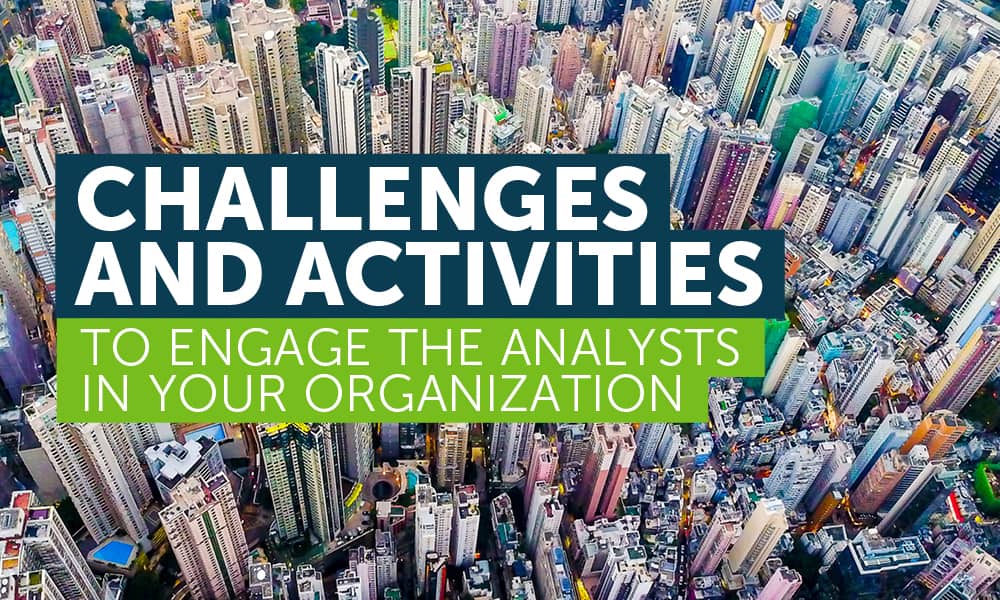Data Communities: Part 3
In my previous two blogs I shared why analytics communities can be a major benefit to an organization that wants to become data-driven and discussed my four-pillar approach to creating and growing your own analytics community.
Today I want to give you my recommendations for three specific ideas involving activities and in-house analytics challenges you can create to engage your analysts and drive collaboration, learning and a bigger interest in how your organization uses data.
How do activities help you engage your community?
Relying on people to start their own engagement with data often results in an uncoordinated and potentially siloed approach. I recommend setting up activities centrally to start with and aligning those activities with the overall data strategy and the goals of the community you want to build.
To ensure these activities are as effective as possible, they should fulfil the following criteria:
- Build the right habits
- Occur with regular frequency to provide a consistent framework for participation
- Be inclusive as much as possible for people with different levels of expertise and experience
- Link directly or indirectly to specific business objectives
Let’s look at three different activities you could use to engage your analysts.
Build a knowledge exchange
Sharing information and knowledge is key to building an analytics community where people can learn, gain skills and improve their overall competence around data engineering, analysis, Loading...data science and visualization.
Whether you are a small organization with a handful of people working with data, or a large multinational corporation with multiple specialized data teams, enabling ongoing professional development is critical. That’s why the open sharing of information and knowledge is a cornerstone of your analytics community.
If you are in the process of starting your community, I recommend collaborating with others to collate all the available resources into a single place, be it a shared drive, a Google drive or a page on the intranet. Making content accessible is a good first step on which you can build.
Once your community grows and evolves, this knowledge exchange can develop into a platform such as an internal online forum and discussion group where people can even post blogs, how-to-articles and share step-by-step video tutorials with others.
Supplementing this with interactive communication such as a messaging tool, comment functionality and an element of gamification can make your knowledge exchange an engaging hub of activity where analysts can ask questions and find answers from people internally.
Start a regular analytical challenge
Most analysts I have met enjoy tackling data challenges to draw conclusions from data and turn them into insights. Why not present your analysts with such challenges regularly, asking them to apply their skills and talents to specific technical or business problems.
I suggest selecting a topic or theme for these challenges, for example, using marketing data and asking analysts from different parts of the business to collaborate to find answers to specific business questions. Such initiatives could occur on a quarterly or monthly basis, depending on the availability of data and the complexity of questions from the business.
If you want to establish more frequent challenges, I recommend breaking them down into smaller components. For instance, you could engage your analytics community to review existing processes and analyses and improve upon them.
In the #MakeoverMonday project I run, we focus on Loading...data visualizations, and you could apply the same concept to dashboards, processes and analyses in your organization.
Establishing a regular challenge for your analysts, which also addresses business questions at the same time, is a great way to build consistent learning and practice into their workday and schedule. It is this that makes it much easier for them to achieve expertise and mastery of analytical skills and competencies.
Host an internal conference
It may feel a bit daunting to put the work of your community up for scrutiny through an internal conference, but it is a great opportunity to showcase what your community members have accomplished and to highlight specific areas of expertise to other parts of the business.
Right now, you probably have to run such an event virtually, which reduces some of the lead time and logistical challenges such as finding a suitable venue/conference room and organizing travel and catering.
Start small with a handful of speakers from your community who have compelling use cases, solutions and interesting topics to present. Ensure a mix of technical and business topics, so content appeals to a broad audience across your organization.
Adding a keynote to open the event can help you get everyone on the same page and be aligned to the intention of the conference.
Having each presentation be 20-25min long means you can fill a morning from 9-12, which is a time commitment an audience can accommodate with a notice of two to three weeks.
Whatever format you choose for your event, gather feedback from attendees via a short survey or poll so you and the presenters can learn what worked and what could be improved.
What can you do right now – or tomorrow?
It’s equally tempting and daunting to commit to bigger goals such as an event or a weekly challenge. It’s also nice to have something small you can implement right now that shows results in the short term.
The knowledge exchange is one of those options. You can grow it to any size you want and you will likely see results immediately when you make information more easily accessible for everyone working with data.
It’s time to bring together your analysts, data scientists and data engineers. Unite them around the shared goals of learning, ongoing professional development and of creating greater value for the organization through collaboration.
